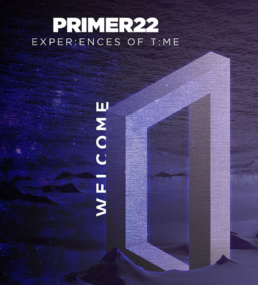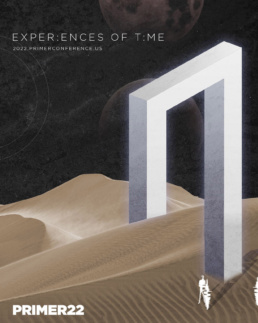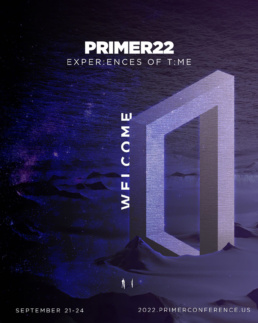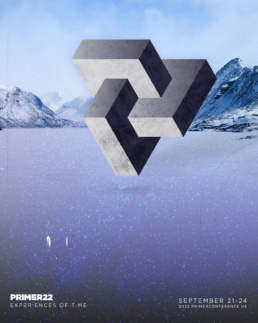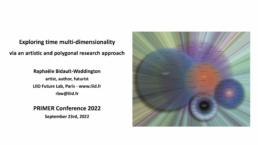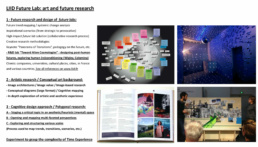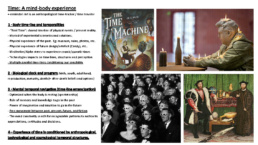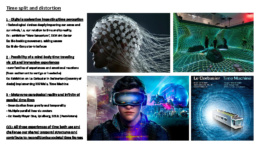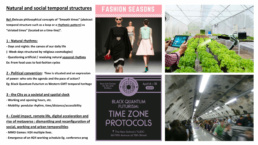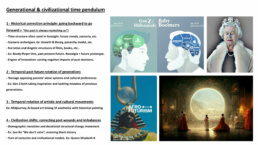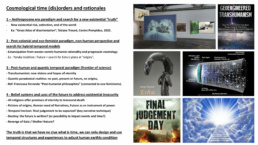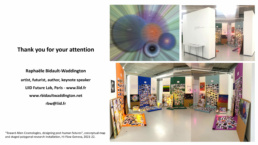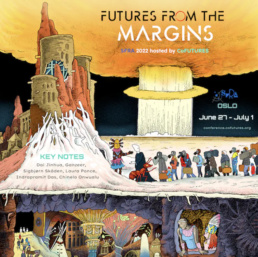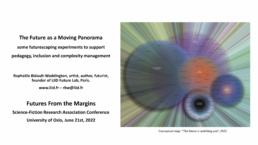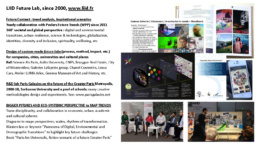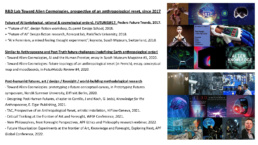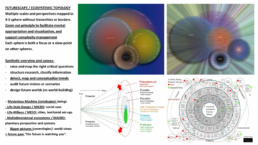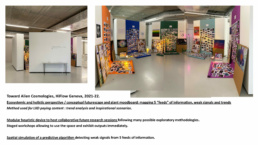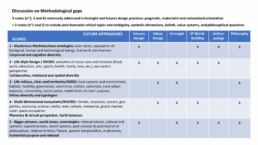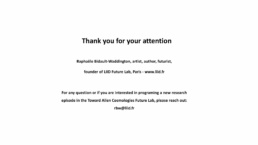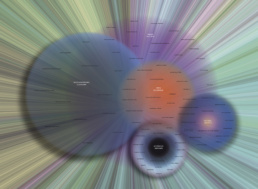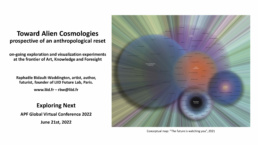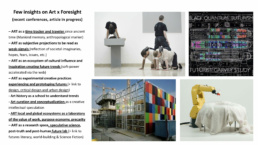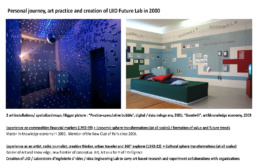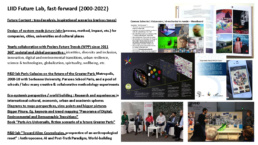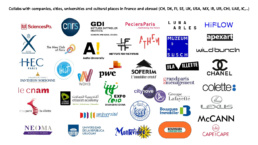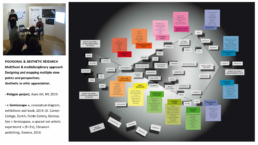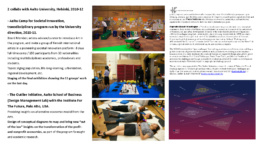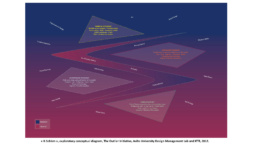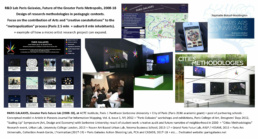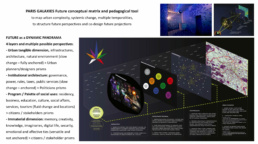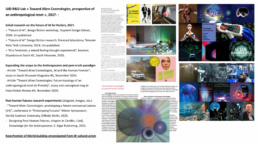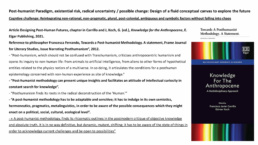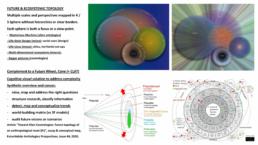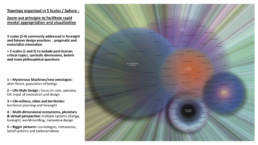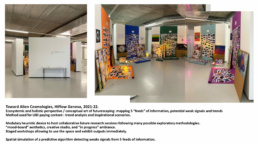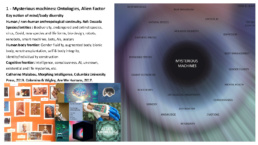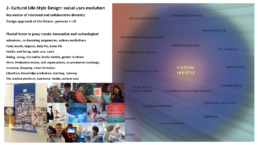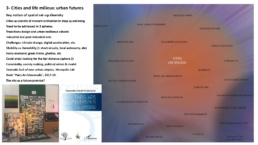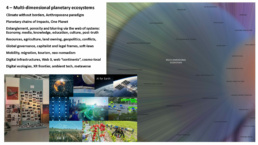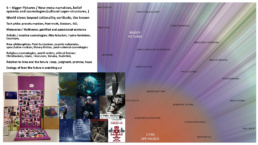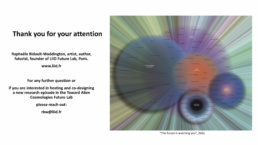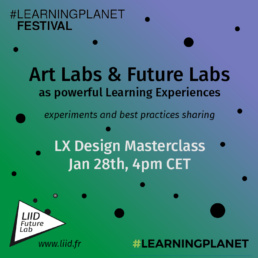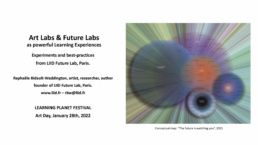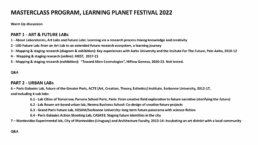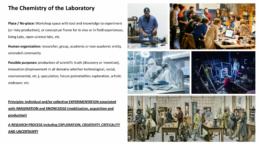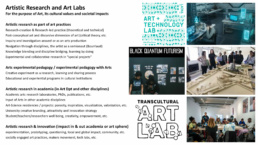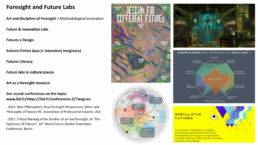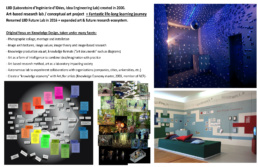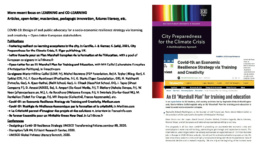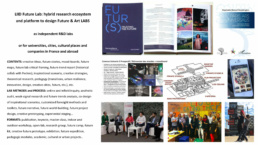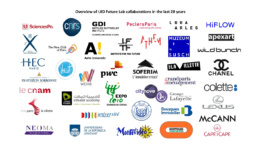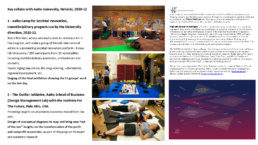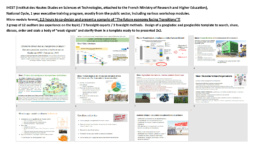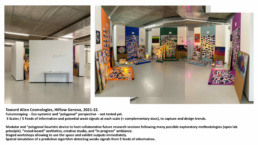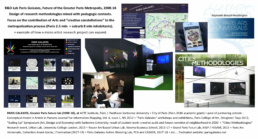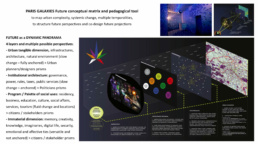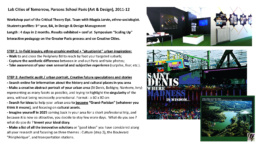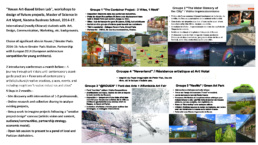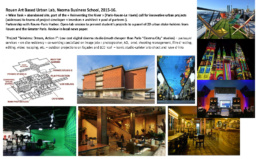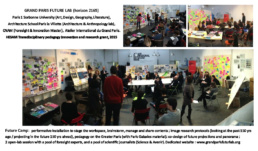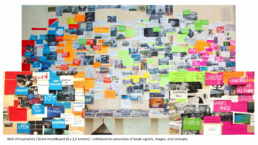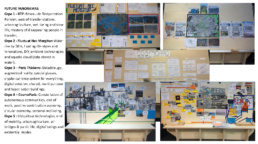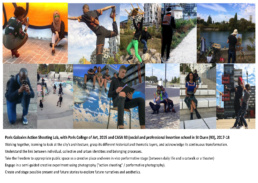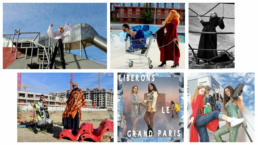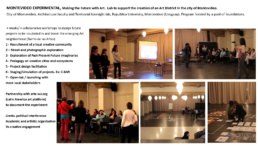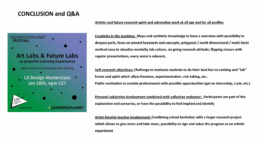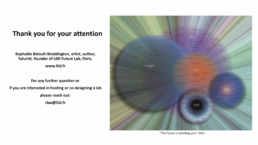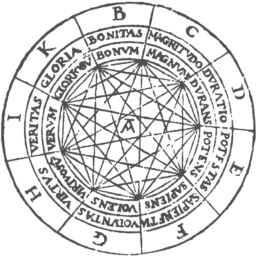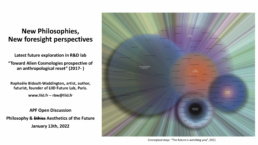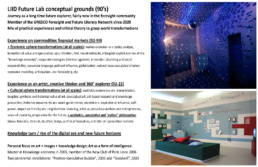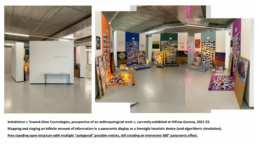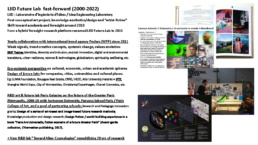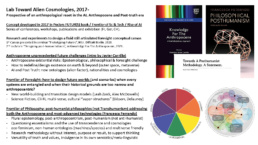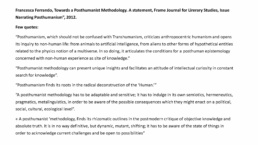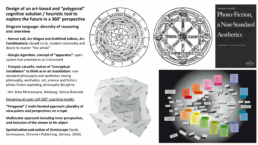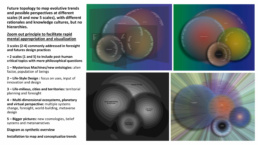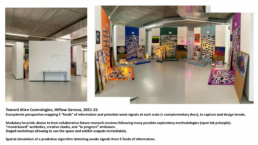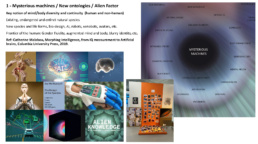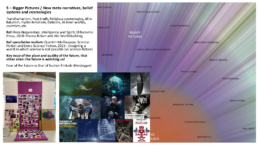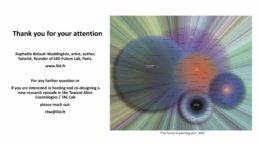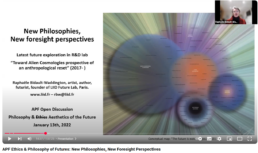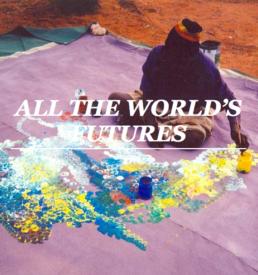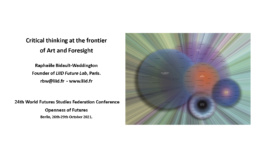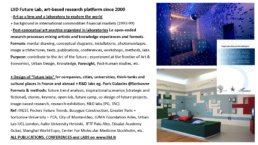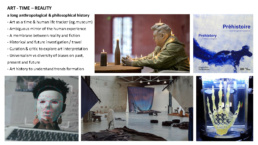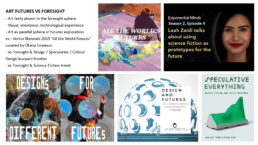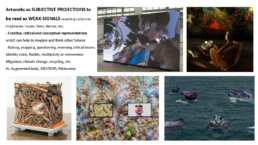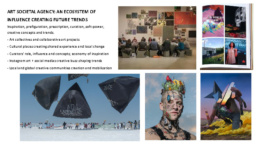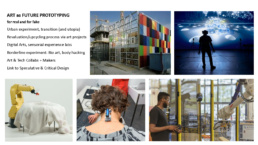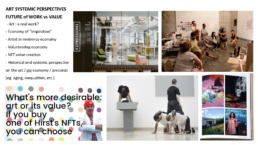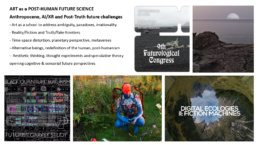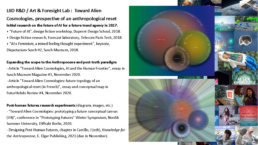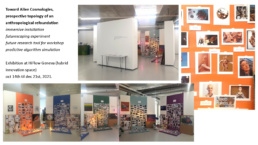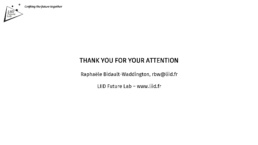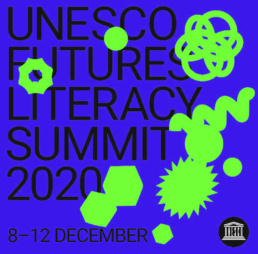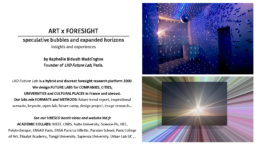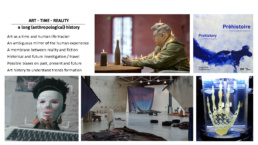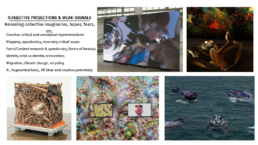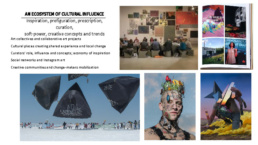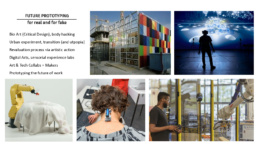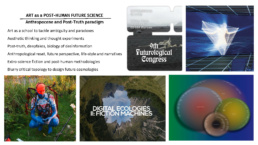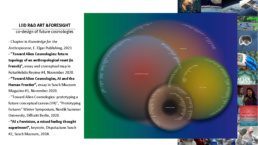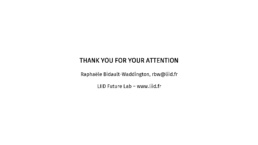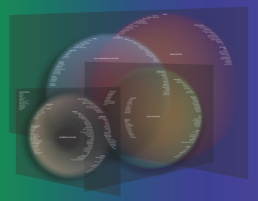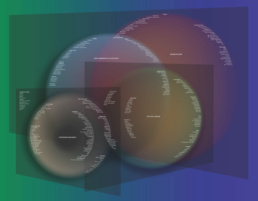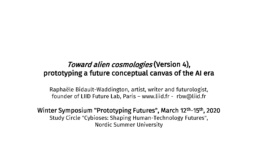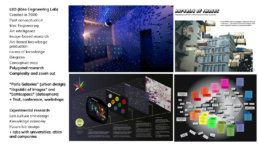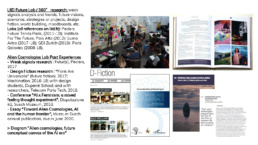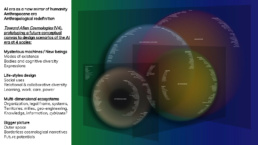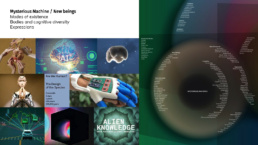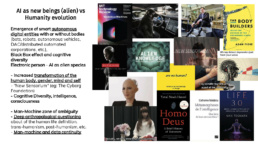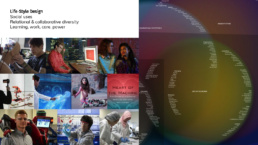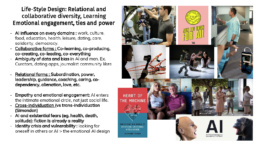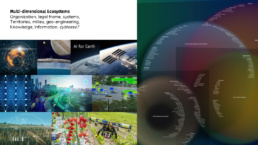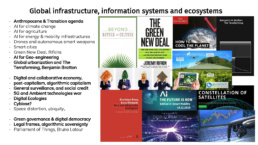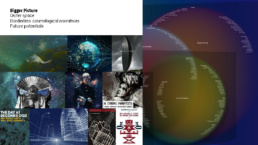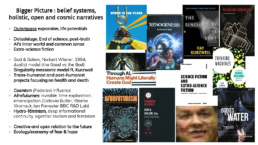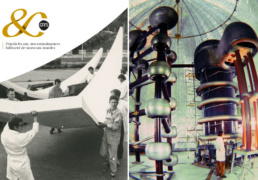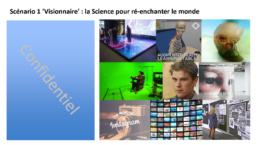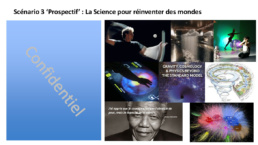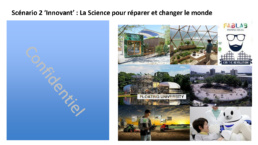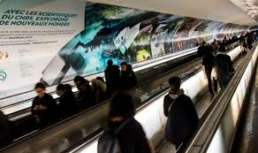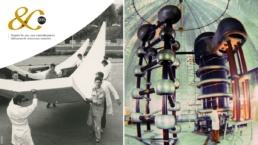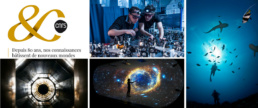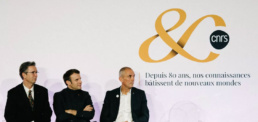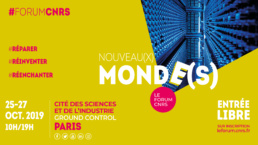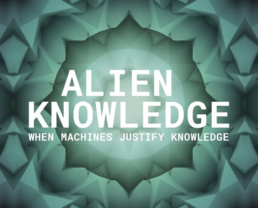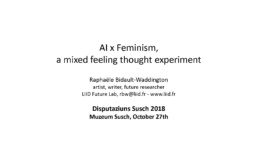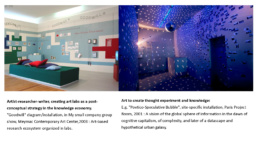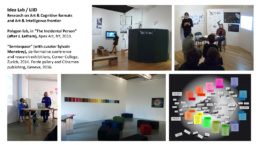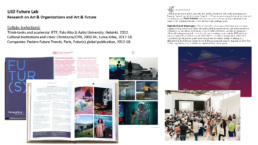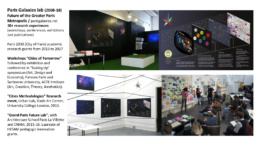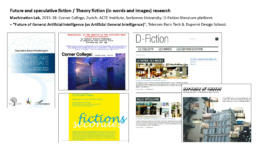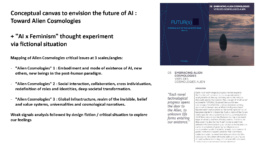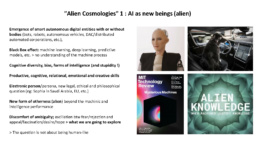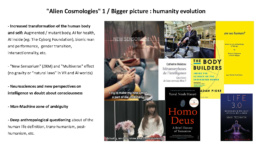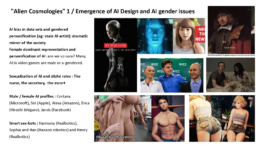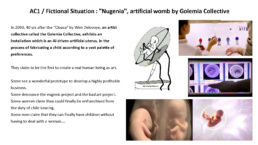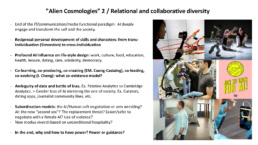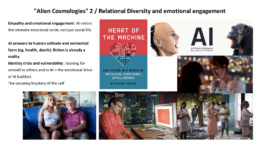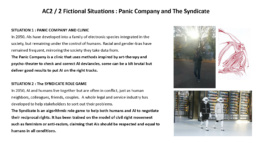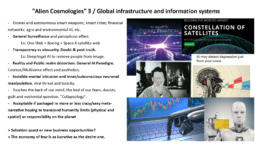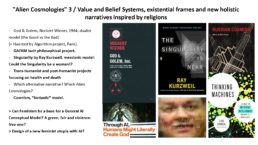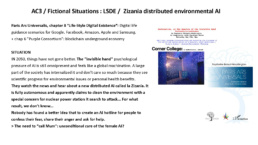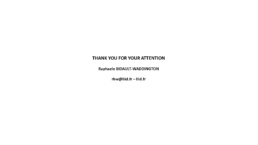Artistic & Polygonal Research on Time multidimensionality, PRIMER, 2022
Exploring time multidimensionality
via an artistic and polygonal research
PRIMER 2022 Global Conference, online, 2022
Dans la continuité de nos réflexions sur les liens entre Art et Futur (Axe 3), nous faisons ici une expérience pour approfondir la question du Temps et de l’évolution des architectures temporelles au regard du changement de monde actuel - notamment l’Anthropocène qui oblige à penser le temps long.-
Le corps et la condition humaine nous inscrivent dans certaines réalités et structures temporelles qui ne sont pas nécessairement immuables ni universelles. L’espace et la diversité cognitive (cosmologies post-coloniales), les technologies ubiquitaires et virtuelles, ou encore les avancées scientifiques impactent tous nos cadres, schémas et représentations temporels.
-
Relier à nos croyances les plus profondes, notamment celles concernant l’avenir, l’expérience du temps s’avère résolument multi-dimensionnelle, ambivalente et infinie. Ces réflexions ouvrent des pistes pour imaginer des cosmologies futures
Abstract
Time is a deeply multi-dimensional, complex and paradoxical experience. On one hand, our senses are able to experience several parallel or entangled forms of time, through events progression inside the real time, whether in the physical environment, in vehicles, via sound, screens and technological devices, images, windows or the distant landscape.
On another hand, and simultaneously or not, our mind is also capable of disrupting the timeline to travel backward and forward, in various dimensions (history, fiction, metaverse, immaterial, cosmos, future, etc.), and thus generating other time shapes and more dynamic time experiences.
Using images, artworks and theoretical concepts from different fields (philosophy, aesthetics, musicology, urban design, etc.), we propose to draw a taxonomy of time shapes and experiences, via a multi-faceted and diagrammatic approach (polygonal research).
RBW
Slides de l'intervention
A propos de la Conference PRIMER 2022
PRIMER, the conference designed to prepare you for the future
In 2022, PRIMER seeks to explore a theme as old as philosophy: we want to share perceptions, experiences, and current state-of-the-art futures practices to look deep, wide, and far into what might soon become the next paradigms.
Experiences of Time
In an era of growing parallelisms and of age-old notions yearning to be redefined, we are brimming on a nexus where our individual and collective consciousness and our presences are increasingly manifesting in – and through – hybrid experiences.
It is certainly a defining time, one of those “perfect storms” in which we can proactively apply our speculative competences to the many challenges ahead envisioning futures with full awareness, with a sense of urgency, or doom. Or, simply, with inertia.
Our theme this year focuses on the experience of time.
Conference program on Instagram
Rappel des axes de recherche du lab
Axe 1 : Transitions et Mondes Futurs
Axe 2 : Innovation Méthodologie Prospective
Axe 3 : Art et Recherche Prospective
Articles associés à celui-ci
Rien trouvé.
The Future as a moving panorama, Sci-Fi Research Association, University of Oslo, 2022
The Future as a Moving Panorama
Introducing a Futurescaping Canvas to Support Pedagogy, Inclusion and Complexity
in Futures From the Margins, Science-Fiction Research Association International Conference, University of Oslo, 2022.
Cette intervention vient mettre en lumière les vertus pédagogiques du TAC Future Canvas pour explorer et concevoir des mondes futurs de manière ouverte, plurielle, intuitive et inclusive. Issu d’une réflexion artistique et prospective, il est conçu pour faciliter la représentation et la structuration mentale du futur, vu comme un panorama prospectif (futurescape) et comme un écosystème multi-dimensionnel et en mouvement.-
Il permet d'alléger la complexité de l'exploration prospective et d'enrichir la palette de ses outils, que ce soit pour organiser une recherche ou pour produire une vision d'avenir, et présente également des affinités avec la Science-Fiction et ses créations de cosmologies et pratiques de world-building. Mais plutôt que proposer et mettre en scène un monde futur donné, le canevas met l'accent sur la diversité de perspective et la possibilité de considérer et situer de nombreux points de vue, afin de s'aventurer à la marge, d'ouvrir les potentialités et mieux inclure.

Abstract
“Toward Alien Cosmologies, prospective of an anthropological reset” is an on-going art-based future lab initiated by LIID Future Lab in 2017 to explore radically new ways of creating and questioning futures in the Anthropocene, AI and Post-truth era. This unprecedented paradigm shift is shaking all our anthropological grounds (human condition, relation to nature, time and space, values and belief systems, etc.) and requires to emancipate from western anthropo-centrism, materialism and epistemological frames, which still dominate conventional foresight practices. Post-humanist and non-western philosophies are important cognitive resources in that regard, but also art and aesthetics to liberate imagination, adventure into more free-style cognitive paths, and generate ex-centric future vocabularies at the periphery of dominant futures.
Through iterative research, the lab developed a fluid and non-hierarchal conceptual canvas to design or appreciate, individually or collectively, future worlds or rather “cosmologies”. These stand as borderless, hybrid (real, virtual and fictional) future universes where alternative rationalities, life-styles, hybrid ecosystems and modes of existence can be designed as speculative experiments.
In these future and more-than-human cosmologies, the alien is as much the human who needs to reinvent sustainable ways of living on Earth, as AIs’ mysterious black-boxes, avatars, non-humans, viruses and other strange species fashioned by bio-engineers, and more generally the unknown and the future. How to live in the future and make a society with the alien factor?
For the conference, we will introduce the canvas, which works as a “polygonal” critical topology.
RBW
Option (if additional time or space): we will perform a narrative system of five entangled stories created with the canvas, to prototype and simulate a first and most likely dysfunctional future cosmology. These stories are narrated along a visual demonstration made of artistic photomontages but also include real-life characters, places or stakeholders. Instead of falling into radically alternate worlds or science-fiction aesthetics (where world-building approaches often lead), the experience searches to play with the ambiguity between reality and fiction, and with the make belief mechanisms at the heart of our relation to the future. The stories will also include a theoretical dimension, half way between philosophical tales of the future and theory-fiction experiments, in order to touch on and relate key critical future topics in an un-orthodox way. As far as now, we have no clue of where that will lead us…
Slides de l'intervention
A propos de 'Futures from the Margins'
What do futures look like from the margins? The 2022 SFRA Conference is dedicated to visions of human futures that center and foreground the issues of those from the margins, including Indigenous groups, ethnic, religious, and sexual minorities, and any people whose stakes in the global order of envisioning futures are generally constrained due to the mechanics of our contemporary world. For many people around the world imagining radically different futures has a life or death quality, as their presents are beset by societal discrimination, poverty, inequality, and precarity, as well as the acute effects of climate change and the global environmental crisis. How can futures from the margins speak to power in presents?
We are especially interested in contemporary “futurisms” that foreground the margins, expose market processes in manufacturing majoritarian futures. Possible topics include but are not limited to:
• Speculation and Demanding the impossible
• Theories of contemporary futurisms
• Indigenous Sciences and speculative worldbuilding
• Neo-colonialism and speculative futures
• Worldbuilding the Otherwise
• Climate change and futures from the margins
• Critical dystopias in climate change thinking
• Pleasure Activism and Speculative Thinking
• New philosophies of time in futurisms
• Resistance and politics of hope
• Cofuturisms
Site et programme de la conférence : conference.cofutures.org/2022-conference/
Rappel des axes de recherche du lab
Axe 1 : Transitions et Mondes Futurs
Axe 2 : Innovation Méthodologie Prospective
Axe 3 : Art et Recherche Prospective
Articles associés à celui-ci
Rien trouvé.
Future visualization experiments, Exploring Next, Association of Professional Futurists, 2022
TAC, prospective of an anthropological reset
on-going exploration and visualization experiments at the frontier of Art, Knowledge and Foresight
Exploring Next, APF (Association of Professional Futurists) Global Conference (online), 2022.
Rappelant la richesse des ponts entre recherche artistique et prospective, l’intervention retrace comment le design du TAC Future Canvas s’inscrit dans la continuité de travaux antérieurs du LIID future Lab et des pratiques artistiques de Raphaële Bidault-Waddington (Image Lab, installation Polygon, diagramme Sémioscape).-
Le TAC Future Canvas est ensuite déplié selon ses 5 sphères / échelles de transformation et de projection du monde vers le futur. Chacune est animée de nombreuses tendances et illustrée de moodboards, l’installation artistique exposée chez HiFlow à cette même période en donnant une vue encore plus large.
-
La création de diagramme présente des vertus formelles (visualité, cartographie d’ensemble, rapport sensible), conceptuelles (méthodologie, structure de raisonnement, ordonnancement, clarté pédagogique), et prospectives (cartographie du changement, vision en écosystème, perspectives multiples).
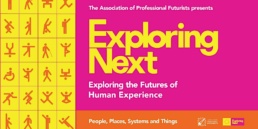
Présentation
APF, Association of Professional Futurists, in pleased to announce its first fully online global conference.
𝐸𝑥𝑝𝑙𝑜𝑟𝑒 𝑁𝑒𝑥𝑡. . . 𝑇ℎ𝑒 𝐹𝑢𝑡𝑢𝑟𝑒𝑠 𝑜𝑓 𝐻𝑢𝑚𝑎𝑛 𝐸𝑥𝑝𝑒𝑟𝑖𝑒𝑛𝑐𝑒: 𝑃𝑒𝑜𝑝𝑙𝑒, 𝑃𝑙𝑎𝑐𝑒𝑠, 𝑆𝑦𝑠𝑡𝑒𝑚𝑠, 𝑎𝑛𝑑 𝑇ℎ𝑖𝑛𝑔𝑠
From how and where people are living to the systems and things that are shaping our modern world, Explore Next brings together top world-class futurists and industry leaders to explore experiences that you may expect in the near-term, mid-term, and long-term futures.
With topics ranging from next-generation cities and the future of food to cyber security and transhumanism, this conference will feature keynotes, workshops, panel discussions, field trips, and networking events.
𝙎𝙤𝙢𝙚𝙩𝙝𝙞𝙣𝙜 𝙛𝙤𝙧 𝙀𝙫𝙚𝙧𝙮 𝙏𝙞𝙢𝙚 𝙕𝙤𝙣𝙚
With speakers on 6 continents, this conference offers presentations for 3 regions over 8 non-consecutive days.!
Parallel Streams
Select your favourits sessions out of three different streams, running in parallel:
1. SAGE = Keynotes, Presentations,
2. EXPLORER = Workshops, Interactive,
3. REBEL = Get Suprised, Broaden your Mindset
Slides de l'intervention
Rappel des axes de recherche du lab
Axe 1 : Transitions et Mondes Futurs
Axe 2 : Innovation Méthodologie Prospective
Axe 3 : Art et Recherche Prospective
Articles associés à celui-ci
Rien trouvé.
Art & Future Labs as LX, Learning Planet Festival, 2022
Art & Future Labs as Powerful Learning Experience (LX)
Partage d’expérience
Online masterclass, Learning Planet Festival, Learning Planet Institute, 2022.
Durant ce masterclass interactif, RBW vient présenter les aspects pédagogiques de ses laboratoires de recherche artistiques, urbaines et prospectives, et montre combien ce type de pratiques exploratoires, et plus généralement la ‘culture lab’, peuvent être des accélérateurs d’apprentissage.-
La revalorisation de cet aspect de ses expériences s’inscrit dans une réflexion plus large sur le rôle de la formation comme levier déterminant des transitions et de la fabrique du futur, ainsi que sur le futur de l’apprentissage (learning) dans et en dehors de la sphère académique.
-
Le masterclass est organisé en partenariat avec le LX Design group qui rassemble sur Meet Up et via des webinars des acteurs européens de l’innovation pédagogique dans des contextes non-académiques et à vocation inclusive.
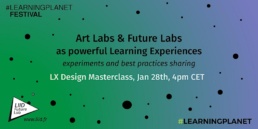
Présentation du webinar sur eventbrite
During this 90mn masterclass, Raphaële Bidault-Waddington, artist, researcher and founder of LIID Future Lab, will share a great diversity of artistic and future oriented experiments, showing how they become powerful learning experience (LX). Q&A will be taken for each presented case.
A broad scope of learning formats, contexts (school, academic research, work and culture) and profiles will be covered, from senior and highly educated executives, to Masters students or youth in difficulty, showing how, in all cases, a « creative lab » culture fosters learning desire, openness and empowerment. By definition, a « creative lab » thoroughly combines creativity, knowledge and experiment …
As a relaxed and discovery-oriented Friday afternoon, the discussion with participants will allow to collectively look for additional insights on creative pedagogy, futures literacy and LX innovation.
The zoom link is sent in the registration confirmation email.
Learning Planet Festival: https://festival.learning-planet.org/
Additionnal information: Tribune published by Raphaële Bidault-Waddington to advocate for training and creativity to tackle the Covid crisis in 2020: https://medium.com/@rbidaultwaddington/covid-19-an-economic-resilience-strategy-via-training-and-creativity-fffcd04b50f6
Slides de l'intervention
Rappel des axes de recherche du lab
Axe 1 : Transitions et Mondes Futurs
Axe 2 : Innovation Méthodologie Prospective
Axe 3 : Art et Recherche Prospective
Articles associés à celui-ci
Rien trouvé.
Ethics & Philosophy of Futures, Association of Professional Futurists, 2022
New Philosophies, New Foresight Perspectives
on-going research
in ‘Ethics and Philosophy of Futures’, Open Discussion #5, Association of Professional Futurists, online event, 2022.
Sur une invitation de Sylvia Galluser, curatrice des rdv "Ethics & Philosophy of Futures" de l'APF, ce webinar est l’occasion de partager les réflexions et références philosophiques mobilisées en arrière-plan des recherches et expérimentations méthodologiques menées par le lab (Axe 1 et 2).-
L’horizon grand ouvert et spéculatif des cosmologies alien impose de se positionner à la frontière et même à l’avant-garde des nouvelles approches de la connaissance, de la philosophie, de la prospective ou encore de l’art et de la fiction : réalisme spéculatif et fiction-hors science (Meillassoux), théorie-fiction (Negarestani), philosophie non-standard (Laruelle), et philosophie post-humaniste (Ferrando), font partie des auteurs qui informent les travaux du TAC Future Lab, de même que les philosophies pré-modernes (Lull, Leibnitz).
-
En introduction de la séance, nous invitons Pr Javier Carrillo à venir présenter Knowledge For the Anthropocene (Elgar, 2021) dans lequel nous ébauchions ces réflexions post-humanistes.
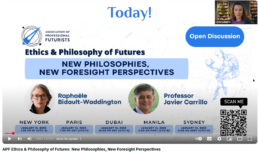
Presentation
Building on her recent chapter ‘Designing post-human futures’ in Knowledge for the Anthropocene (eds, Carrillo, J. & Koch, G.), and current exhibition/lab ‘Toward Alien Cosmologies, prospective of an anthropological reset’ in Geneva, Raphaële Bidault-Waddington will introduce the diversity of emerging philosophies that she mobilizes to open, think and structure new future perspectives.
The Anthropocene, but also the AI era and the post-truth paradigm, currently shake all our anthropological foundations, ranging from our terrestrial anchoring and (toxic) lifestyles, to anthropocentric value-systems, rationality principles and forms of consciousness. How can we design resilient future worlds, or even cosmologies, to navigate these uncertain and blurry horizons? As Professor Carrillo will highlight in the introduction, the epistemological (and ethical) challenges raised by this unprecedented planetary context require innovation in both our foresight and cognitive practices.
Presenting LIID’s on-going R&D future lab, Raphaële will highlight non-conventional philosophies, such as post-humanist philosophies (Ferrando), speculative and non-standard philosophies (Meillassoux, Laruelle) and theory-fiction (Negarestani) among others, to explore new future rationalities and methodologies.
This research also includes reflections on knowledge formats and art-based experiments. Mixing her experiences in knowledge economy, conceptual art, urban design, academic research and pedagogy, Raphaële will show how she designs hybrid future labs and heuristic devices (conceptual maps, artistic installations, fiction and image-based speculative experiences, etc.) to address the complexity and cognitive challenge of the future. Her practice resonates with current foresight explorations on world-building and transition design (Zaidi), and with futurescaping practices (Jain).
Slides de l'intervention
Enregistrement du webinar sur Youtube
Rappel des axes de recherche du lab
Axe 1 : Transitions et Mondes Futurs
Axe 2 : Innovation Méthodologie Prospective
Axe 3 : Art et Recherche Prospective
Articles associés à celui-ci
Rien trouvé.
Art & Prospective, 24th World Future Studies Federation Conference, Berlin, 2021
Critical Thinking at the Frontier
of Art and Foresight
The Openness of Futures, 24th World Future Studies Federation (WFSF) World Conference (online program), Berlin, 2021.
Approfondissant l’intervention faite en 2020 à l’UNESCO, cette conférence revient d’abord sur la question du Temps qui est au cœur de l’art, celui-ci étant non seulement un marqueur, mais aussi à nombreux égard un véhicule d’exploration et de voyage temporel, que ce soit vers le passé, le présent ou le futur, dans toute leur multiplicité.-
Du côté de l’avenir, les écosystèmes artistiques produisent un foisonnement de signe du changement qu’il reste à décrypter. Ils font aussi émerger des tendances et des prototypes contribuant à la fabrique du futur dans de très nombreux domaines (technologies, éducation, bien-être, vie citoyenne, etc.). Ils constituent en réalité un véritable de laboratoire de recherche spéculative, par exemple sur la question du futur du travail ici mise en lumière.
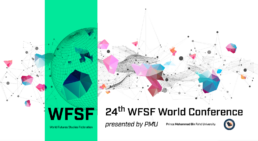
Abstract
If Art has always been a source of inspiration to Foresight, its critical frontier and contribution to Future research is still under-discussed – as opposed to Design (Candy) or Science-Fiction (Zaidi). In this communication, we will show via a rich selection of references, how contemporary art practices and critical thinking can open futures. If futurism is the explicit intention of few artistic movements in the 20th and 21st century, Art is not dedicated to the future per se.
Art operates as a non-conventional anthropological time tracker and time traveler, alongside mankind’s past, present and future. Its multicultural and non-instrumental character creates space to re-define and decolonize visions of the past, historical “truths” or past futures, provides a multi-perspective lens on the present, and lays the ground for alternative insights on the future.
Beyond their visual or affective dimensions (generally considered in foresight), Art productions can be read as weak-signals revealing societal transformations, imaginaries and trends in all domains. Since the 90’s, certain artists, curators and critics have seen Art as a critical laboratory, questioning related value-systems and philosophical frames, the very principle of interpretation and speculation, and the porous border between reality and fiction.
Exploring the depth of the aesthetic experience via Art supports the investigation of the many facets of the future, that other ambiguous fiction. Art thus complements the more performative and use-centric prism of Design on the future.
Then Art experimentation and communities can also prototype futures, incubate societal, technological or urban transformations, and shape cultural trends via their live and virtual ecosystems of influence.
Finally, more recent artistic research projects create innovative methods and trans-disciplinary and speculative rationales, which open new entries and contributions to Futures Literacy and Foresight knowledge at large. TAC Future Lab is positioned on this specific zone of artistic and foresight innovation.
RBW
Slides de l'intervention
A propos de The Openness of Futures, 24th WFSF Global Conference
The conference theme reflects the broad dimensions and dynamics of futures studies and describes an arena in which we explore the expansiveness of our imagination – an open universe prepared to deal with the grand challenges of our time, beautifully articulated as desirable visions of sustainable progress and hope.
The Openness of Futures is an invitation to travel into a new era for futures.
In these futures you will be able to experiment with technology enhanced methods and teaching, transdisciplinary approaches to opportunity-based problem solving and new paradigms and concepts for global collaboration and societal development.
Site et programme de la conférence : wfsfconferenceberlin2021.org
Rappel des axes de recherche du lab
Axe 1 : Transitions et Mondes Futurs
Axe 2 : Innovation Méthodologie Prospective
Axe 3 : Art et Recherche Prospective
Articles associés à celui-ci
Rien trouvé.
Art x Futures, 'Blended Futures' Foresight Journal panel, UNESCO FL Summit, 2020
Art x Futures
Speculative bubbles and expanding horizons
in « Blended Futures”, Foresight Journal panel, UNESCO Future Literacies Summit, 2020.
Cette intervention est l’occasion de commencer à formaliser des réflexions sur comment l’Art (les arts) et la recherche artistique contribuent au futur et à la recherche prospective.-
En s’appuyant sur de nombreux exemples internationaux, la présentation repart du fait que les productions artistiques constituent, depuis la nuit des temps, un marqueur anthropologique et temporel, et même un véhicule d’exploration temporelle dans toutes ses dimensions et directions (sujet que nous retravaillons ultérieurement - voir les expériences associées).
-
D’autre part, les productions et écosystèmes artistiques contribuent au futur de différentes manières : signes du futur, écosystème d’influence, prototypes et communautés contribuant à l’innovation et au changement, ou encore espace de pédagogie et de recherche spéculative, font parties des pistes jalonnées...
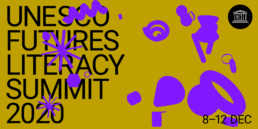
A propos du Sommet de l’UNESCO et du panel
En décembre 2020, l’UNESCO organise un sommet international dédié à la prospective et à la Littéracie des Futurs’’ intégralement en ligne avec de nombreux acteurs de la prospective (dont LIID Future Lab) invités à présenter leurs travaux sous la forme de stands virtuels et à proposer des événements en ligne.
A cette occasion, le Foresight Journal organise différents panels dont “Blended Futures #1: Learning from Art, Design, Urban Design, Science-Fiction & Algorithmics to renew foresight practices” auquel prend part Raphaële Bidault-Waddington, parmi d’autres événements.
‘Blended Futures: Learning from Art, Design, Urban Design, Science-Fiction & Algorithmics to renew foresight practices’, an Open-lab session organized by the Foresight Journal at UNESCO Future Literacies Summit, December, 11th at 2pm (CET)
Video https://www.youtube.com/watch?v=at0gq7etLJs
The Future Literacies Summit is an invitation to open and renew foresight methodologies, to make them more accessible, agile and engaging, or else more critical, disruptive and impactful. In that regard, the foresight community could learn and better integrate in its methods, insights coming from other disciplines addressing the future from different perspectives and vocabularies.
In this exploratory session, the Foresight journal will invite unconventional foresight experts to share and discuss the specific inputs from art, design, urbanism, science fiction and algorithmics domains.
Host: Ozcan Saritas, Editor of Foresight Journal
Guests: Raphaële Bidault-Waddington (LIID Future Lab, France), Jean-Paul Pinto (Univ. of the Valley, Colombia), Dan Hill (Vinnova, Sweden), Maggie Greyson (Designer & Futurist, Canada), and Masaru Yarime (Univ. of Science & Technology, Hong Kong)
Slides de l'intervention
Rappel des axes de recherche du lab
Axe 1 : Transitions et Mondes Futurs
Axe 2 : Innovation Méthodologie Prospective
Axe 3 : Art et Recherche Prospective
Articles associés à celui-ci
Rien trouvé.
Symposium 'Prototyping Futures', Cercle 'Cybiosis', NSU, Diffrakt, Berlin, 2020
Toward Alien Cosmologies
Prototyping a future conceptual canvas of the AI era
Symposium ‘Prototyping Futures’, Nordic Summer University, Study circle « Cybiosis : Shaping Human-Technology Futures », at Diffrakt – Centre for Theoretical Periphery, Berlin, 2020.
Tirant des conclusions des travaux précédents sur les enjeux prospectifs de l’IA et sur l’ampleur de son impact sur le monde, ce rendez-vous est l’occasion de prototyper et mettre en discussion avec un cercle de recherche artistique et hybride, un premier canevas conceptuel servant d’outil possible pour structurer une perspective d’avenir.-
Ce premier diagramme sert en premier lieu à positionner et ordonner des thèmes prospectifs de manière très fluide, exploratoire et sans objectif spécifique. Il comprend à ce stade 4 sphères soit 4 dimensions du monde : Mysterious Machines (êtres humains et non-humains), Life-Style Design (Modes de vies et usages), Multi-dimensional Ecosystems (Systèmes et planète), et Bigger Pictures (Visions du monde).
Abstract
Toward alien cosmologies is an exploratory and incomplete conceptual canvas we started to model in 2017 in the frame of a research on the societal impacts of AI (commissioned by a future research agency), using a « weak signals » prospective methodology. AI is touching on and distorting every facets and dimensions of our existences, from the most intimate sphere to the society, the city, the economy, the law and even the planet and the space. It has become an ambiguous mirror of the human condition and of all of our uncertainties at each of theses scales.
In this new paradigm, the human is as alien as the AI, and both need new world visions (cosmologies). Toward alien cosmologies is an investigation to design new, humble and approximating anthropological futures in the AI era, using a creative and hybrid method that allows to bridge knowledge disciplines and social practices. For the symposium, we offer to briefly share the past research steps and continue the process of designing the alien cosmologies future research framework.
The live presentation will be an occasion to test and discuss with the audience its latest prototype, taking the shape of a large scale conceptual diagram, and mapping the future speculative panorama.
Following the first research step, we tested in 2018-19 with design students (Duperré School) and engineering researchers (Telecom Paris Tech), a series of (incomplete) design fiction experiments to prototype possible futures situations via indirect creative and critical experiences that still give a concrete sense of their materialization and allow to appreciating their multidimensional impacts. This prototyping method allows a concern for the broader societal and symbolic dimensions, is an alternative to pragmatic « solutionist » or object-based prototypes, and offer new possibilities to prototype at the large scale (eg. organizations, cities, worlds) or in the conceptual realm (as we do).
These experiments dialog with more theoretical and multi-disciplinary investigations to be shared in conferences such as at Susch Muzeum (Switzerland) and a long essay in the museum annual publication due soon. As in the diagram, classic theories (philosophy, anthropology, ecology, digital humanities) entangle with more fringe fields (afro-futurism, hydro-feminism, dataism).
RBW
Slides de l'intervention
A propos de "Prototyping Futures", Nordic Summer University Winter Symposium
Symposium organised by NSU Study Circle #2: Cybioses – Shaping Human-Technology Futures
SCIENTIFIC / ORGANIZATION TEAM : Palle Dahlstedt, Rafael Dernbach and Maru Mushtrieva
In our previous symposia, we have examined improvisation, creativity, and projection as key practices of shaping futures: when is improvisation required in making or imagining futures? Can creativity be automated? And how can projecting into the future prevent us from repeating and prolonging what already exists today?
For our fourth symposium, we want to examine the practice of prototyping. Building a prototype means creating an incomplete sample or model to test an idea. Prototyping usually has two features: firstly, it demonstrates the feasibility of an idea. Often this occurs by translating conceptual knowledge to experiential knowledge: what has worked in theory becomes visible and palpable and then hopefully works in practice as well.
And secondly, prototyping accelerates a production process. The incompleteness, small scale or limited functionality of a prototype allows for an accelerated test. Simply said, the quickest way to build something is to build something else.
About NSU Study Circle ‘Cybioses’ : www.nsuweb.org/study-circles/circle-2-cybioses-life-in-the-future-imperfect/
Rappel des axes de recherche du lab
Axe 1 : Transitions et Mondes Futurs
Axe 2 : Innovation Méthodologie Prospective
Axe 3 : Art et Recherche Prospective
Articles associés à celui-ci
Rien trouvé.
Nos Connaissances bâtissent de Nouveaux Mondes, 80 ans du CNRS, Paris, 2018-19
Nos Connaissances bâtissent de Nouveaux Mondes
Réflexions prospectives et co-design d'un programme pour les 80 ans du CNRS
Direction de la Communication du Centre National de la Recherche Scientifique, Paris, 2018-19.
Ce futur lab consiste à mettre en place une cellule de réflexion prospective avec toute l’équipe de la communication (20 personnes), afin de soutenir le design d’un ambitieux programme d’événements locaux, nationaux et internationaux pour les 80 ans du CNRS, autour du thème ‘Nos connaissances bâtissent de nouveaux mondes’.-
Il est l’occasion d’utiliser et d’enrichir nos recherches prospectives sur le changement de monde en cours, d’ébaucher des premières cartographies des enjeux multi-scalaires des grandes transitions - qui impulsera ensuite la conception du TAC Future Canvas -, d’ouvrir de nouvelles questions et perspectives d’avenir sur le futur de la connaissance dans toutes ses dimensions.

Présentation du lab
Le CNRS (Centre National de la Recherche Scientifique) est le deuxième plus gros institut de recherche scientifique au monde avec plus de 1100 laboratoires dans tous les domaines de la connaissance, et 28 000 chercheurs en France et à l’étranger.
A l’occasion de ses 80 ans la Direction de la Communication souhaite repositionner l’institut à l’avant-garde de la recherche scientifique internationale, en proposant un ambitieux programme d’événements à Paris et en région. Ces événements, structurés autour du grand thème de « Nos connaissances bâtissent de nouveaux mondes », sont destinés aussi bien à la communauté scientifique française, européenne et internationale, qu’au grand public, ou encore aux écosystèmes d’innovation.
Afin d’accompagner la conception et la curation de ce vaste programme, nous mettons en place une démarche d’inspiration prospective (futur lab) pour nourrir les équipes de la Direction de la Communication (20 personnes), co-concevoir et positionner cet agenda dans les transitions et tendances les plus actuelles.
Le lab comprend :
– Une série d’entretiens internes pour clarifier les enjeux stratégiques du CNRS,
– L’apport d’éclairages prospectifs sur les grandes transitions en cours et leurs implications, que ce soit pour la science, la société, ou le monde ;
– Des séances travail en petit groupe ou en atelier ;
– L’apport d’idées et le pré-design de « scénarios d’inspiration prospective » pour faciliter aussi bien la pluralité que la convergence ;
– Des recommandations de lieux, de partenaires ou de formats d’événements de nouvelle génération.
Dans le respect de nos engagements contractuels de confidentialité, nous ne communiquons pas les contenus produits et idées développées.
quelques slides extraites de la recherche amont et utilisées dans le kit d'atelier
quelques images des très nombreux éléments du programme d'événements
Rappel des axes de recherche du lab
Axe 1 : Transitions et Mondes Futurs
Axe 2 : Innovation Méthodologie Prospective
Axe 3 : Art et Recherche Prospective
Articles associés à celui-ci
Rien trouvé.
Do They Dream of Electric Sheep?, Muzeum Susch, Suisse, 2018
AI x Feminism
a mixed feeling thought experiment
Disputaziune #2 « Do They Dream of Electronic Sheeps » (Curator: Mareike Dittmer), Muzeum Susch, Suisse, 2018.
Cette keynote est l’occasion de reformuler de manière très synthétique les enjeux multi-scalaires de l’IA depuis leur ambiguïté ontologique jusqu’au défis planétaires, puis d’adresser plus spécifiquement la question du genre, en s’appuyant sur de nombreux ‘signes du futur’ ainsi que sur les expériences fictionnelles du lab réalisé cette même année.-
Biais genrés des algorithmes et du machine learning accentuant les inégalités et les clichés, féminisation archétypale des interfaces de l’IA favorisant leur acceptabilité, sexbots augmenté d’IA, reproduction humaine optimisée ou remplacée par l’IA, IA ersatz de la relation amoureuse ou du besoin d’amour universel…
-
Les enjeux de l’IA qui se jouent en miroir de ceux de l’humanité, permettent de revisiter sous un nouvel angle toutes les problématiques du genre, et de mobiliser les philosophies féministes à l’endroit des technologies et notamment de leur subordination.
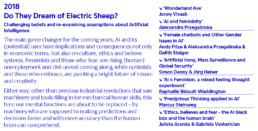
Following a series of recent researches about the future of AI and its specific ecology of affects, I would like to create and share a new thought experiment, to highlight critical issues, address ambiguities and play with paradoxes at the cross-road of AI and Feminism. The discursive perambulation will set and navigate a broad almost vertiginous, cognitive panorama, mirroring the one of AI.
RBW
Slides de l'intervention
A propos de Dispataziune Susch #2 "Do They Dream of Electric Sheep"?
Challenging beliefs and re-examining assumptions about Artificial Intelligence
The main game changer for the coming years, AI and its (potential) uses have implications and consequences not only in economic terms, but also on culture, ethics and believe systems. Pessimists and those who fear, see rising (human) unemployment and civil unrest coming along, while optimists and those who embrace, are painting a bright future of leisure and creativity.
Either way, other than previous industrial revolutions that saw machinery and tools filling in for mechanical human skills, this time our mental functions are about to be replaced – by machines who are supposed to making predictions and decisions faster and with more accuracy than the human brain can comprehend.
The scale of this challenge has not fully arrived with government agencies, business leaders and scientists, and it seems essential to think about frameworks and regulations that would accompany this change before it settles without other leading forces than the profit-making of the tech industries. Algorithmic deficiencies based on the biases of the programmers need to be identified and a code of conduct as well as greater diversity among the engineers and computer scientists developing AI could go a long way toward minimizing these biases.
To quote Marina Gorbis, executive director of the Institute for the Future: “We need technologists who understand history, who understand economics, who are in conversations with philosophers, we need to have this conversation because our technologists are no longer just developing apps, they’re developing political and economic systems.” These are very present issues that need to be urgently addressed, since the technologies become more prevalent.
Thus, we want to bring diverse speakers from science, art, academia, tech and economy together to analyse the factual status of AI, its impact and its possible futures, and to discuss agencies broaching the mysticism of both technological and artificial power structures, the changing narratives in the human machine discourse and the transfer of gender imbalances from the physical to digital worlds:
Can empathy be programmed and what is it to be human? Does it matter that AI is 95% coded by men? Do we replace the Deus ex Machina with machines with godlike attributes? What holds believes?
By taking facts to arguments and charging them with tension we will intensify the energy thinking holds and playfully expand realities.
Rappel des axes de recherche du lab
Axe 1 : Transitions et Mondes Futurs
Axe 2 : Innovation Méthodologie Prospective
Axe 3 : Art et Recherche Prospective
Articles associés à celui-ci
Rien trouvé.
